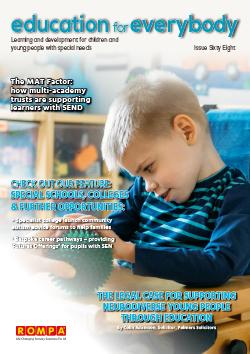Autistic people and people who have learning and communication disabilities often struggle to gain meaningful employment. We need to challenge that and prove to companies that they are capable, are committed and do have the skills to be valuable employees. They are equal citizens and would be a benefit to any company by bringing their own skillset & talents.

At Homefield College we’re working hard to improve our students’ employability chances by preparing them with skills for working life, finding work placements suited to their interests, and working with employers to create inclusive workplaces. We also run our own enterprises to provide supportive real-life working environments that help equip our students with the knowledge, experience and transferable skills needed to secure external work placements and future employment.
During World Autism Acceptance Week 2022, final year Homefield student Ethan shared his experiences of being autistic and having a rare condition called DAMP. He wants to break down the stigma attached to autism and DAMP and make the world a better place. Ethan calls upon employers to give people like him a chance because he’s a worthy employee who has a lot to give: “We want equal opportunities for employment so we can work with other people to gain new skillsâ€.
Work experience, vocational activities and employability advice are vital parts of the study programme and careers strategy in preparing autistic students and students who have learning & communication disabilities for adulthood. However, this also relies on companies being open to supporting this. Whilst companies hosting work placements and Supported Internships are really important, we acknowledge that some employers may not have the resources or capacity to do so at this time – but there’s still many ways they can help in other ways.
Here are just a few examples of how employers can engage with SEND students:
· Offer careers talks – hearing about roles in different sectors allows students to narrow down their interests and identify which ones are suitable to their skillsets. Make sure you include visuals to back up any verbal points.
· Provide company tours – seeing workplaces in action helps break down misconceptions and provides a visual understanding of what different roles entail. Whilst these are better in-person, you can also film a site tour for students to watch in class at their own pace.
· Conduct mock interviews – help students learn techniques to present themselves appropriately to potential employers. Provide feedback and make suggestions on how the candidate can improve their skills. You could also role-play interview situations with the tutor and get students to pause the scene and point out what went well / what could be improved or offer suggestions for what the tutor should say.
· Demonstrate CV writing skills – providing samples of good practice helps students understand what employers look for in a CV for future job applications.
Once students are work-ready, we then find that a main barrier to getting a paid job is the employment process itself. People with special educational needs & disabilities often find it hard to excel in traditional approaches to recruitment where candidates are selected based on the strength of their application form and / or CV, which then may lead to an interview (whether in person, over the phone or video call). This can be due to many factors and we provide suggestions as to how employers can overcome these / what SEND settings can advocate for during conversations with employers:
· Job Description & Person Specification
o Applicants may be lacking the formal qualifications or specific experience examples requested, despite having the skills and abilities to perform – only list qualifications as essential when they really are vital to the role, consider whether it’s really necessary to have a minimum years’ worth of experience as part of the criteria, appreciate that transferable skills are just as important
o The tasks listed may be worded unclearly, or overly complicated – don’t use jargon, make sure you write out any acronyms, keep job descriptions short and to the point, provide an easy-read format, allow the applicant and / or a person advocating on their behalf to learn more about the job beforehand by seeing it in action.
· Application Form
o The questions may be worded in an unusual way – run your questions through a user testing panel that includes disabled people, give clear instructions and examples of what you are looking for in an answer.
o The company may only accept forms in a certain format – be open to receiving applications in alternative formats such as over a phone call, through a recorded video response, or forms completed on behalf of an applicant by a support staff, Job Coach or advocate.
· Interview Process
o Applicants may take longer to process interview questions and struggle to articulate clearly under pressure – provide longer processing time, send the interview questions to the applicant in advance, allow for an advocate to join the interview, offer working interviews instead.
o There are tests as part of the interview that disadvantage the applicant, such as set timings, unclear instructions, or specific formats such as needing answers written – give advance warning of what the test will be, allow extra time for the applicant to process and complete the task, offer working interviews instead.
You’ll have noticed we mentioned working interviews in those suggestions. At Homefield, we are promoting employers to offer working interviews as a reasonable adjustment. Working interviews are hands-on, giving the employer the opportunity to see the candidate in action.
Before the interview begins, a Job Coach meets with the employer to understand the role and see the tasks they would like that future employee to do – this is called a task analysis. The company may also be sent the candidate’s vocational profile. This tells them what roles and industry sectors the person with special educational needs is interested in to ensure that the candidate genuinely wants to work for their organisation.
The Job Coach then attends the interview with the candidate and supports them to become competent and independent doing the job. The employer can see how the candidate works and decide whether they would like to offer them employment directly, a Supported Internship prior to employment, or whether the interview has been unsuccessful. We have created our own information sheet about Working Interviews for employers and encourage other schools & colleges to share material about this reasonable adjustment at recruitment fairs or during employer engagement activities to increase awareness of this option.
There’s still a long way to go to break down the stigma and barriers to employment for those with additional needs, but the reasonable adjustments above are easy wins for employers to work towards creating more accessible work places, and the suggestions on what schools and colleges can ask for from employers helps bridge the gap towards paid employment and provides meaningful encounters to shape students’ careers guidance.
If you are interested in learning more about the work we do at Homefield College as an independent specialist Further Education college, please visit our website www.homefieldcollege.ac.uk, call us on 01509 815696 or send an email to contactus@homefieldcollege.ac.






